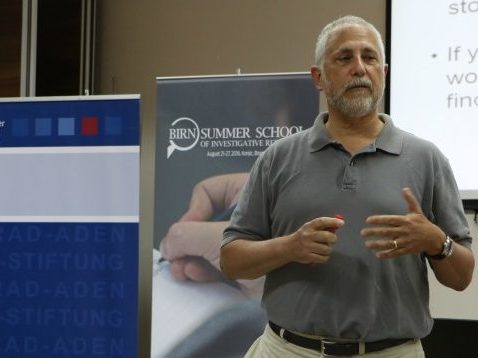 The third day of BIRN’s Summer School Master Class of Investigative Journalism started with Paul Myers, an expert in using social media for investigations, offering tips on searching Twitter and Facebook for investigative stories
The third day of BIRN’s Summer School Master Class of Investigative Journalism started with Paul Myers, an expert in using social media for investigations, offering tips on searching Twitter and Facebook for investigative stories
“If you have to approach the person on social media, try to do it over the publication’s [media] account and not your private account, and then people will attack your company and not you,” Myers told participants at the school, held this year in the historic town of Konjic, in Bosnia and Herzegovina.
“In short, everybody we’re investigating is either on Facebook or has family on Facebook. The information you can get from different social networks, websites, directories are offering a mosaic of information that you can wander around […] proving things that need to be proved, finding new information you didn’t have before that will help to develop your stories,” he added.
Blake Morrison, lead trainer and investigative projects editor at Reuters, held a session on the art of interviewing.
Morrison said: “My philosophy on interviewing is pretty simple… Think of it as an important meeting. With a stranger,” explaining that the interviewee needs to “be understood”.
“It’s important to be authentic, because people can tell when someone is unauthentic and misrepresent themselves,” he added.
“If we do a job well, there is nothing to be embarrassed about. That’s the confidence I am talking about,” Morrison said.
“It’s very important to be curious. If you don’t understand something, don’t presume, ask,” he concluded.
He explained that there are three types of interview: information interviews, which involve collecting information on something; accountability interview, asking the person to explain his or her acts; and emotional ones, in which person sheds light on his or her emotional perspective.
Morrison emphasised the need for preparation and gave an insight into why people agree to give an interview: vanity, need to be understood, self-interest, desperation, guilt and curiosity.
Jim Mintz, an adjunct professor of the Stabile Centre for Investigative Journalism at the Columbia Journalism School, spoke about how to develop sources.
“I am here to spur your ambition to go deeper in developing sources,” he emphasised, “and not expose only people that are responsible for wrongdoings, but systems of wrongdoing”.
“All investigative stories start from outside and one wants to get inside. Since things are in the heads of people, one must have skills for developing source,” he added, explaining that journalist must enter a “deep inside a secret world”.
Mintz explained that entering this “secret world” will lead journalists into complicated “mazes” of complex relations and events.
“In this maze, you’ll find people that genuinely can help you, that can guide you,” he said.
Mintz explained that journalists should try to develop genuine relationships with sources.
He concluded that it is very important that journalists work hard in order to gain the trust and respect from sources.
After the joint sessions, participants split into smaller groups for sessions with Mintz, investigative reporter and regional editor with the Organized Crime and Corruption Reporting Project, Miranda Patrucic and former editor at Milwaukee Journal Sentinel, Martin Kaiser.
The Summer School is organised by the Balkan Investigative Reporting Network, BIRN, in cooperation with the Media Program South East Europe of the Konrad-Adenauer-Stiftung and with the support of the Open Society Foundations and USAID Macedonia.
